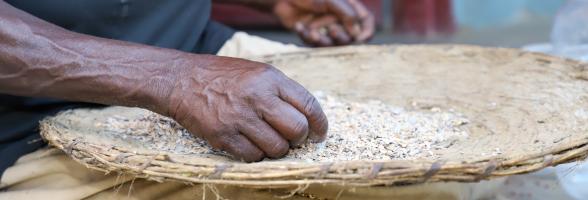CONTEXT:
The world is facing multiple connected and worsening crises. Unjust and unsustainable food systems are failing to deliver food and nutrition security, living incomes, and decent working conditions for the increasing numbers of people. Extractive and unsustainable use and governance of land and other natural resources are contributing to the loss of livelihoods, as well as pollution, biodiversity loss, ecological breakdown, and climate change.
Climate breakdown is wreaking havoc worldwide, causing increased hunger, poverty, and inequality and threatening the survival of all of humanity. The impacts of these crises are profoundly unequal – rural women and communities in many countries across Africa, Asia, and Latin America are disproportionately affected.
To rise to these complex challenges, an ambitious, integrated approach is needed. To achieve this, we need to align and combine the forces, efforts, and resources of multiple partners and stakeholders to achieve transformative change at a systems level. Cultivating change is, therefore, a program that will aim to accelerate efforts to shift global food systems over the next five years to meet the needs of those most impacted by inequality and compound disasters.
Our vision is of fair and sustainable food systems that support thriving, food-secure and climate-resilient rural communities. To achieve this, we will work at the nexus of the food, land and the climate crisis recognizing the need to address systemic inequalities through a multi-sectoral, integrated approach.
This integrated program has been developed to build on Oxfam’s decades-long experience of working with rural communities and allies from local to global levels to fight the food, land, biodiversity, and climate crises, including the SIDA-financed SeedsGROW program (2013-2023). The program will contribute towards the Sustainable Development Goals (SDGs) 2: Zero hunger, 5: Gender equality, 8.8: Protect labour rights and promote safe and secure working environments for all workers, 12: Responsible consumption and production, 13: Climate action and 15: Life on Land systems.
In practice, it means that Oxfam’s unique local-to-global approach, combining our direct programming with communities at the frontlines of the food, land, biodiversity and climate crises with our national and global influencing work with allies and movements, has a higher chance at having impact and changing the systems that are causing these crises, thanks to the expanded reach and scope of our strategies.
ABOUT THE PROJECT:
In a bid to empower rural women and their communities, Oxfam in Uganda and a consortium of partners including Participatory Ecological Land Use Management Uganda, Eastern and Southern Africa Small-scale Farmers’ Forum (ESAFF), and Community Integrated Development Initiatives (CIDI), are implementing a four-year initiative in Uganda with funding from The Swedish International Development Cooperation Agency (SIDA).
The program will tackle inequalities in food systems, climate change and land and natural resource governance.
PROJECT AIM:
- Rural women and their communities are thriving and empowered agents of change in a fair, green, equal and safe world.
WHOM WE WILL WORK WITH
- Small Holder Food Producers
- Climate change activists.
- Land rights advocates
- Local government technical teams & Land boards
EXPECTED RESULTS
- Rural Women and Communities adopt Agro- Ecological Practices and Grow more diverse crops.
- Rural Women and Communities lead in managing Biodiversity and Ecosystems.
- Rural Women & Communities have strengthened capacities for climate change adaptation and mitigation
IMPLEMENTING PARTNERS
- Participatory Ecological Land Use Management (PELUM) Uganda.
- Eastern and Southern Africa Small-scale Farmers’ Forum (ESAFF)
- Community Integrated Development Initiatives (CIDI)
DURATION:
- 5 years (2024 - 2028)
TOTAL BUDGET:
- €1,120,000
FUNDED BY:
- The Swedish International Development Cooperation Agency (SIDA)
GEOGRAPHICAL COVERAGE:
- Adjumani
- Apac,
- Soroti
- Amuria

